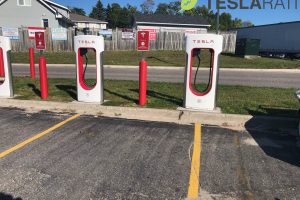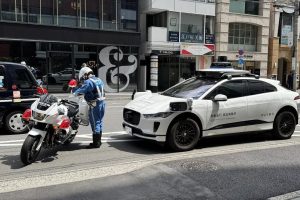Key Points
- 🔍 Three Tesla owners filed a class action lawsuit on August 2, 2023, claiming that Tesla “exaggerates” its range ratings.
- 🚗 The plaintiffs are James Porter, Bryan Perez, and Dro Esraeili Estepanian, who state that Tesla’s false advertising led to overvalued range ratings.
- 🛣️ The lawsuit alleges that Tesla’s vehicles did not deliver the advertised estimated range under normal driving conditions.
- 📉 The complaint cites evidence of Tesla’s history of inflating range estimates, including recent fines by South Korean regulators.
- ⚖️ The plaintiffs seek to represent all California Tesla vehicle purchasers and aim to address questions of whether Tesla knew and concealed the exaggeration of range ratings.
Three Tesla owners have sued the automaker in a class action lawsuit that was filed on August 2, 2023, after a report from Reuters last week claims the company “exaggerates” its range ratings.
Teslarati examined the complaint, and we are here to give you a breakdown of what the suit says and what the three plaintiffs are suing Tesla for.
THE PLAINTIFFS
Tesla is being sued by James Porter, Bryan Perez, and Dro Esraeili Estepanian, who state in their complaint against the automaker that their action “arises out of Tesla’s false advertising of its electric vehicles’ range, which Tesla grossly overvalued when selling the vehicles to consumers.”
According to the complaint, Porter owns a Model Y Performance and noticed a discrepancy in his vehicle’s range was compared to what it told him:
“After taking delivery of his Tesla vehicle in June 2022, Plaintiff Porter fully charged his vehicle to 100% battery charge and took a 2-hour trip to visit family, approximately 92 miles away. When he arrived at his destination, Plaintiff Porter noticed that the vehicle was left with approximately 40% charge.”
Perez owns a Model 3 Long Range, and the complaint states he had the same issue:
“After receiving his Tesla vehicle, Plaintiff Perez fully charged his vehicle to 100% battery charge and took an approximately 90-mile trip to visit his parents. After returning home from the approximately 180-mile round trip, he noticed that his vehicle showed that it had roughly 10-15% charge remaining.”
Estepanian also has a Model 3 Long Range, and the complaint describes a similar situation:
“Plaintiff Estepanian travels 140 to 150 miles round trip for his daily commute, and he routinely charges his vehicle to 90% battery charge (which equates to approximately 299 miles), per Tesla’s recommendation. Based on a 90% battery charge (and 299-mile starting range), he typically returns from his approximately 150-mile round trip each day and his Tesla vehicle’s screen displays that approximately 100 to 110 miles of range remain, which equates to roughly 33% battery charge remaining. Thus, Plaintiff Estepanian’s electric vehicle consistently loses approximately 189 miles of range during his daily commute—despite only driving approximately 140 to 150 miles round trip each day.”
THE PLAINTIFFS’ CLAIMS
The plaintiffs state that range is a key feature of electric vehicles and is “one of the most important features that consumers generally consider when purchasing an EV, because it correlates to the distance they can travel before needing to recharge the vehicle.”
Throughout the suit, the complaint shows images of Tesla’s website, highlighting range ratings and other “key features,” including top speed and acceleration.
They also include other pieces of evidence that seem to indicate Tesla has exaggerated range estimates.
One part of the complaint states:
“Tesla’s tactics to inflate the range estimates for its vehicles has continued. Recently, South Korean regulators fined Tesla for false advertising the ranges of its vehicles. Specifically, the Korea Fair Trade Commission found that Tesla exaggerated the “driving ranges of its cars on a single charge, their fuel cost-effectiveness compared to gasoline vehicles as well as the performance of its Superchargers.”
They also stated that other car companies to do not exaggerate range ratings, citing Recurrent’s testing of the Ford Mustang Mach-E, Chevrolet Bolt, and Hyundai Kona:
“Other electric vehicle manufacturers do not overestimate the range of their vehicles to the same extent. For example, Recurrent tested the Ford Mustang Mach-E, the Chevrolet Bolt, and the Hyundai Kona—all electric vehicles and direct competitors to Tesla model vehicles—and found their estimated ranges to be more accurate. In fact, the Hyundai Kona generally underestimated the range the vehicle could travel before requiring a recharge.”
ALLEGATIONS IN THE CLASS ACTION SUIT
The plaintiffs seek to represent anyone in California who purchased any Tesla vehicle and hope to solve questions including:
- a. Whether Tesla model vehicles fail to deliver the advertised estimated vehicle range in normal driving conditions;
- b. Whether Tesla exaggerated its advertised estimated vehicle ranges;
- c. Whether Tesla knew that its advertised estimated vehicle ranges were exaggerated and could not be met under normal driving conditions;
- d. When Tesla gained such knowledge;
- e. Whether Tesla designed, manufacture, marketed, advertised, sold, or otherwise placed its model vehicles into the stream of commerce with such knowledge;
- f. Whether Tesla intentionally concealed the fact that its advertised estimated vehicle ranges were exaggerated or otherwise could not be met under normal driving conditions;
- g. Whether Tesla’s conduct to divert complaints from Class Members who voiced concerns over their Tesla model vehicle’s range violated the terms of Tesla’s warranties;
- h. Whether Plaintiffs and Class Members were harmed by the fraud and deceptive practices alleged herein;
- i. Whether Tesla was unjustly enriched by its deceptive practices; and
- j. Whether Plaintiffs and the Class are entitled to equitable or injunctive relief
The case is 3:2023cv03878, Porter et al v. Tesla, Inc., and has been assigned to Judge Laurel Beeler.





